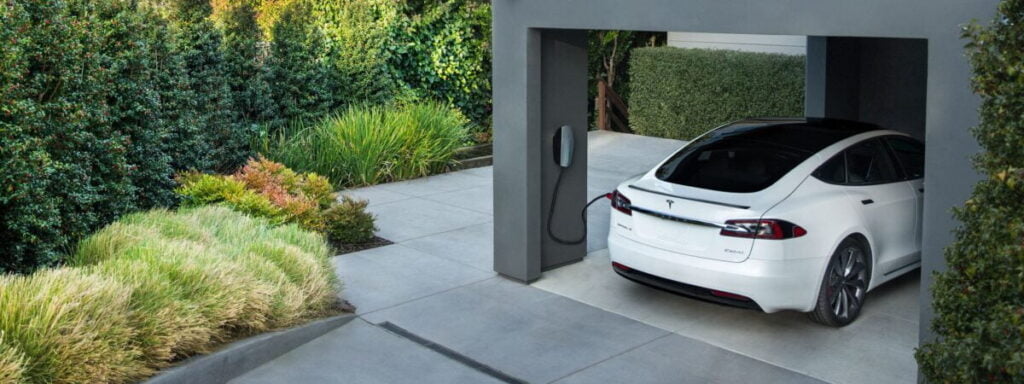Charging your electric car at home or work
Electric vehicle home charging for small electric cars is feasible at home or at work from a 15 amp power point. A power cable plugs into the car’s on-board charger. Most such vehicles have a charging unit inbuilt.

Pic: https://cleantechnica.com/
Some electric car dealers include a home charging assessment price and/or a consultation with a licensed electrical contractor as part of the car’s purchase price.
A typical electric of hybrid used for typical commuting (of 40-50 km a day) uses 2.5-5.0 kilowatt/hours. This, often called one ‘unit’, usually costs less during off-peak periods .
This guide gives some indication of how many kilometres you can drive when charging typical electric cars from a home or similar supply at their maximum rate via that inbuilt charger.
| Type: | Maximum charge (kW) | km per hour of charging |
|---|---|---|
| BMW i3 | 7.4 | 25 |
| Chevy Spark EV | 3.3 | 11 |
| Fiat 500e | 6.6 | 22 |
| Ford Focus Electric | 6.6 | 22 |
| Kia Soul EV | 6.6 | 22 |
| Mercedes B-Class Elec. | 10 | 29 |
| Mitsubishi i-MieEV | 3.3 | 11 |
| Nissan Leaf | 3.3 – 6.6 | 11 – 22 |
| Smart Electric Drive | 3.3 | 11 |
| Tesla Models S & X | 10 – 20 | 29-58 |
Charging is readily done overnight but solar captured during the day can be sold to the electricity supplier.
Electric vehicle home charging – electricity costs (in 2020) across Australia.
| Average prices (per kilowatt/hour) are: | |
|---|---|
| Queensland: | 22.72 cents |
| Victoria: | 24.20 cents |
| New South Wales: | 26.245 cents |
| South Australia: | 36.223 cents |
| Tasmania | 32.137 cents |
| Western Australia | 28.8 cents |
Most suppliers charge about 25 cents per kilowatt hour (off-peak). Even if not using solar it will cost only a dollar or two a day to travel the average daily 40-50 km to and from work. This is far less than for even small petrol-fuelled cars. Most use at least 5 litres per 100 km – typically costing (in mid 2020) about $7.
Meters for electric vehicle charging
You are likely to need an additional meter for a dedicated electric car charging tariff. It may also be necessary to have an electric charging point set up by your electrical contractor. You can save money if you switch to an economy tariff for off peak charging overnight. To be on an economy tariff, you must have a hard-wired dedicated EV charging point. A standard electrical power point isn’t permitted as it does not take long to work out that’s a cheap source also for other purposes!
Electric vehicle home charging – charging from solar
If you charge from a home solar system you have added benefit of no CO2 emissions from this renewable energy source. That required will be the maximum 6.6 kW systems that currently enable rebates. Solar modules, however, are now so cheap that it is feasible to forgo that rebate.
Electric vehicle home charging – home charging set-up cost
The cost of home charging from grid power primarily varies with local electricity price tariff and charging options.
A Victorian electric vehicle report noted that installing a home charging outlet costs around $1,750 for the charging circuit wiring, plus <$100 for a standard electrical power point, up to $500 for a basic dedicated EV charging unit and up to $2500 for a more advanced such unit.
If your choice of charging rate exceeds the standard fuse or circuit breaker rating, those too must be upgraded – but that cost is not high. A licensed electrical contractor can advise re all this.
Before going too far check the varying electricity tariffs for electric vehicle charging, already offered by many electricity suppliers.
If solar power is to be used, in urban areas this is likely to best done by feeding into the grid and buying it back at off-peak rates. Here again – see Electric vehicles – solar charging.
Charging at public charging outlets
An ever-increasing range of service station fast and super-fast chargers charge at rates as high as 135 kW. They can already fully recharge an EV battery in around 30 minutes. In practice, owners will use these only during long drives – and rely on routine charging at home and whilst at work. Electric car vendors too offer this.
There are already fast charging facilities around Australia – including right across the Nullabor.
See: Charge Stations in Australia (https://myelectriccar.com.au/charge-stations-in-australia) or ChargePoint. Prices vary from state to state etc – much as does petrol right now.
Many existing home grid-connect solar systems have excess capacity outside peak periods. Solar energy fed in during the day can be re-drawn during off-peak periods, for much the same price, to charge an electric car. This is because many grid networks have excess capacity outside peak periods. Furthermore, such charging extends battery life: all dislike ongoing deep discharges.
Summary
It is already totally feasible to charge cars from home and office solar. Moreover, it is being done by many owners right now.




